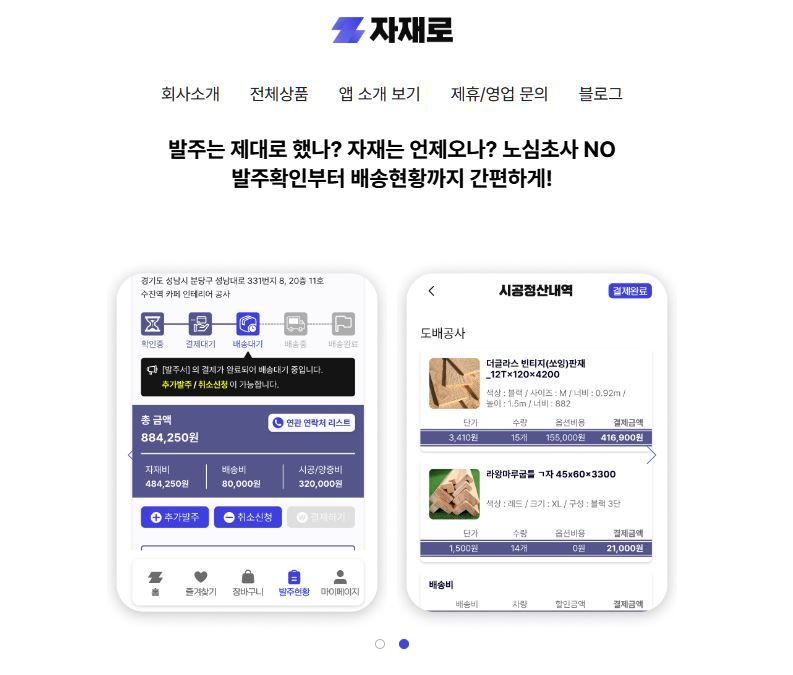All Press Releases for November 01, 2024
[Pangyo Interview] STARCHIUM Leads Construction Digitalization with B2B Interior Material Platform 'Zazaero'
STARCHIUM, under CEO JeongWan Lee, boosts construction with 'Zazaero,' a digital platform enhancing material procurement and logistics for small firms. The company plans global expansion and a B2C shift.
SEONGNAM, KOREA, November 01, 2024 /24-7PressRelease/ -- STARCHIUM (CEO JeongWan Lee) leverages CEO Lee's extensive architectural experience to drive digital transformation in the construction industry, which heavily relies on traditional analog processes. With its B2B material ordering platform 'Zazaero,' STARCHIUM addresses the inefficiencies small-scale construction firms (often with fewer than five employees) face in material procurement.
CEO Lee, drawing on his background in architectural design, founded the company as 'STARCHIUM,' combining 'star,' 'architecture,' and 'space.' Initially focused on an interior construction bidding platform, he identified significant challenges in material order management, leading to the creation of the Zazaero platform.
Zazaero digitizes the ordering process, solving four critical issues: reducing order errors, preventing project delays, improving waste management, and introducing a digital payment system. The platform minimizes financial losses from delays and missing materials and offers comprehensive order and return management to tackle material waste.
Zazero includes a curation feature that connects users to nearby suppliers based on location, helping cut logistics costs, and the Zazaero Pay system, which goes beyond cash transactions to offer multiple payment methods, including deferred payment, enhancing convenience.
STARCHIUM primarily targets small interior construction companies. CEO Lee noted, "Many small-scale construction managers handle everything from design to ordering independently. Zazaero was developed to help these individuals efficiently manage their material orders." The platform focuses on B2B digitalization to reach long-tail markets among over 36,000 small-scale contractors in Korea.
STARCHIUM has plans to enter the B2C market as well. "We see the need for a system like Home Depot's in the U.S., where consumers can directly purchase and install materials," Lee explained. "In Korea, we're exploring the potential for a B2C market, aiming to develop packaging and logistics for easy home delivery."
The company also targets global expansion, with ongoing contract discussions in Indonesia and Vietnam. By creating a supply network for diverse materials overseas, STARCHIUM aims to establish itself as a worldwide platform providing accessible, comprehensive material information.
CEO Lee highlighted Pangyo's conducive environment for startups, with access to cutting-edge technology and investment resources, which is particularly beneficial for digitizing materials management.
Pangyo Techno Valley is a global integrated R&D hub focused on IT, BT, CT, and NT, integrating Research (R), People (P), Information (I), and Trade (T). As Gyeonggi-do's representative innovation cluster, Pangyo Techno Valley was established to secure national new growth drivers such as technological innovation, human resource development, job creation, and enhancing international business competitiveness. As of 2023, 1,666 companies employ 78,751 people, and it has positioned itself as the most innovative hub in South Korea, with sales amounting to 167.7 trillion KRW (125.5 billion USD).
Furthermore, the Techno Valley Innovation Division of the Gyeonggi-do Business & Science Accelerator (GBSA) holds monthly events such as the Pangyo Evening Meet-Up, Pan-Pan Day, and the Pangyo Startup Investment Exchange "In-Best Pangyo" to maximize the value of Pangyo Techno Valley. They also support the Pangyo Overseas Promotion Program to publicize information about Pangyo's companies, products, and services to domestic and foreign investors and the media, thereby facilitating foreign investment.
# # #
Contact Information
Gyeonggido Business and Science Accelerator (GBSA)
Pangyo, Gyeonggi-do
Republic of Korea (South)
Voice: +82 31-776-4834
E-Mail: Email Us Here
Website: Visit Our Website
Blog: Visit Our Blog
Follow Us:



